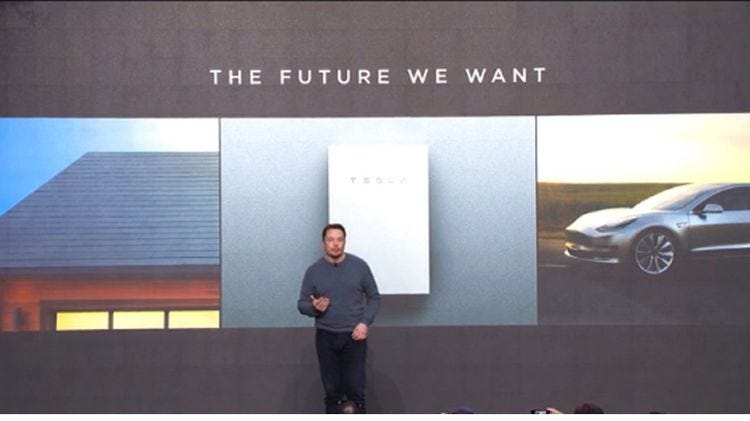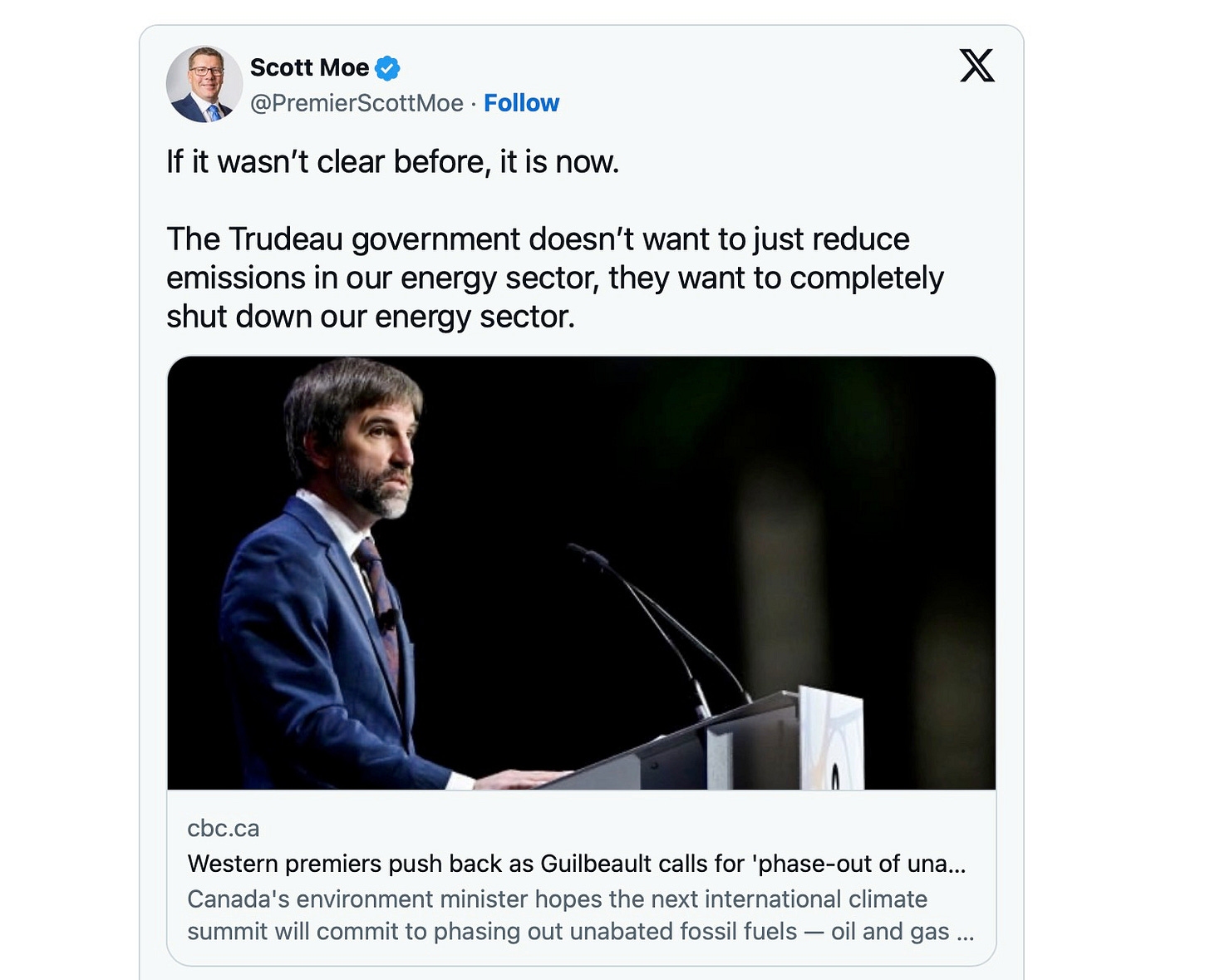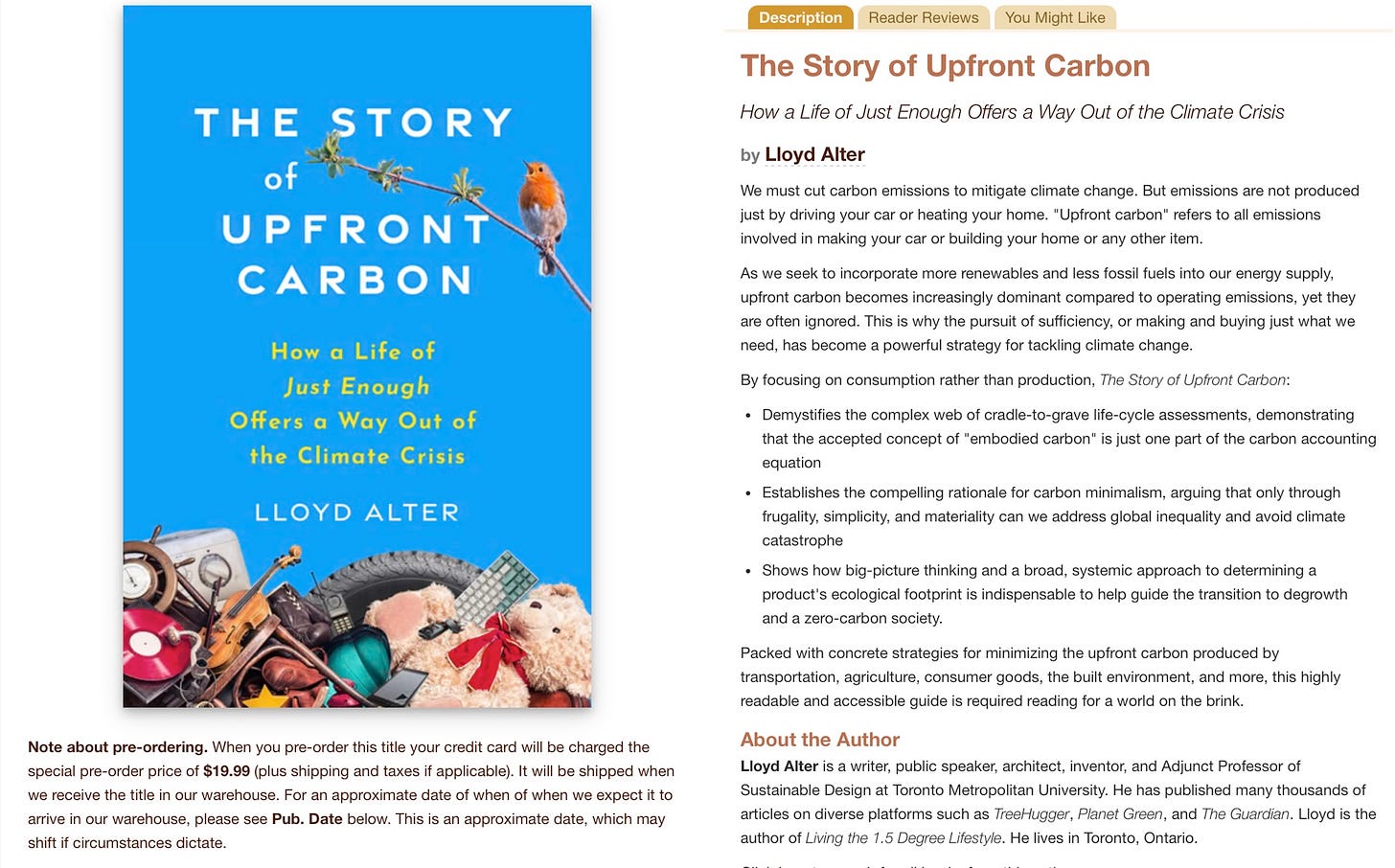To end fossil fuels, "remember, it is the demand that will decide."
Sultan Al Jaber will not shut off the supply, but we don't have to buy what he is selling.
Many climate activists are upset with statements made by COP President and oil company CEO Sultan Al Jaber after the COP28 conference, quoted in the Guardian:
“My approach is very simple: it is that we will continue to act as a responsible, reliable supplier of low-carbon energy, and the world will need the lowest-carbon barrels at the lowest cost,” he said, arguing that Adnoc’s hydrocarbons are lower carbon because they are extracted efficiently and with less leakage than other sources.
“At the end of the day, remember, it is the demand that will decide and dictate what sort of energy source will help meet the growing global energy requirements,” he added.
Some activists say Al Jaber should “set a precedent and demonstrate tangible action away from fossil fuels.” Another says he and his company have to “transition away from oil and gas, or make a mockery of this process.” But I think his statement makes total sense and tells us what we have to do.
Let's look at the first paragraph, where Al Jaber suggests that the world will need the lowest carbon barrels. His crude comes out of the ground easily and can be turned into useable fuel and then transported easily. Compare that to Canadian oil from the Alberta tar sands. Using a measure called the Energy Return on Investment (EROI) middle eastern oil gets a return of as much as 100 units of energy for every one “invested”-burning fossil fuels and emitting CO2. The world average is about 26. Alberta’s in situ oil production gets about 3 to 5 so the Middle East oil is processed 20 to 33 times more efficiently. Alberta oil costs more to produce and sells at a $27 per barrel discount because it costs more to transport and refine. As cars go electric and demand drops as predicted ( starting in 2028 according to the IEA), the difficult, inefficient and expensive Alberta oil will not be competitive and Big Al Jaber will be the last man standing.
But far more important is the next sentence:
“At the end of the day, remember, it is the demand that will decide and dictate what sort of energy source will help meet the growing global energy requirements.”
Al Jaber will keep the supply side going as long as he can; that is his business. It’s up to us to work the demand side. We know this goes; we saw this movie in 2020 at the pandemic's peak. As I wrote in my book Living the 1.5 Degree Lifestyle,
We saw what happens when we stopped consuming during the pandemic: Oil companies lost billions. Major frackers like Chesapeake Energy went bust. Airlines failed or laid off tens of thousands of employees. The fuel- thirsty 747 was retired. The world changed when we stopped buying what they were selling. It changed not because of production but because of consumption, which is what really drives the economy.
More recently, in my upcoming book, The Story of Upfront Carbon from New Society Publishers, I write more explicitly about demand. Here’s an excerpt:
When Elon Musk announced his new solar shingle a few years ago, he stood in front of a rendering of a house on a suburban lot with the solar shingle roof, a Tesla car and Powerwall battery in the garage, and a banner headline over the top: THE FUTURE WE WANT.
Musk is a “supply side” kind of guy. He wants to make stuff and sell it to you, claiming this is the way we will get off fossil fuels.
More recently, MacArthur Prize winner, inventor, and entrepreneur Saul Griffith and the organization he founded, Rewire America, have been pitching “electrify everything,” where we can have it all: “same-sized homes. Same-sized cars. Same levels of comfort. Just electric." David Roberts of Volts is all in for this, calling it“the story that needs to be told about tackling climate change. Not a story of privation or giving things up. Not a story of economic decline or inexorable ecological doom. A story about a better, electrified future that is already on the way.”
Griffith and Roberts are also supply-side guys (they are almost always guys), envisioning a world of renewable power feeding our single-family suburban homes with solar panels on the roof and electric cars in the garage. The problem with almost all supply-sider solutions is that they don’t scale; there is not enough lithium, copper, space, money or, most importantly, time. And, of course, they have not even thought about the upfront carbon emissions of it all.
Then there are the demand-side guys, who believe that we have to stop consuming so many resources and reduce the demand for energy and fossil fuels. Engineer Nick Grant thinks they are two different personality types:
My hunch is that the world is divided into “less is more” demand-side people, who focus on reducing their demand for emissions-heavy products and processes, and “less is a bore” supply-side people, who look for solutions within the sector that emits them—it is a personality trait.
Demand-siders dream of bicycling to small homes that keep warm from body heat. This is not Roberts’ “story of economic decline” but an achievable positive vision. But it’s boring. Grant notes that a friend of his with a roof covered in solar panels brags about how much money he saves but that there is no such excitement from sealing air leaks. Solar panels and batteries are expensive and, to a certain extent, are what Thorstein Veblen might have called conspicuous consumption, while insulation and air sealing are invisible and inconspicuous. Grant wrote in his 2012 article for Building Design:
I suggest that if we continue to prioritise a supply-side approach, we will be locked into a spiral of increased consumption. We can cover all surfaces with PV, cut down all the forests for biomass, plant palm oil to fuel our vehicles and install heat pumps in all buildings, but demand will always be just ahead of supply. Success should not be judged by the amount of green kit installed but by how close to sustainable levels of consumption we get.
Grant wrote this a decade ago before upfront carbon was on the radar, which significantly changed our understanding of sustainable levels of consumption. He concludes: “We need to rethink our entire approach and match demand to supply rather than fleeing into the future in a futile attempt to match supply to demand.”
All of which brings us back to Sultan Al Jaber. Of course, he is going to keep selling oil; that’s his job. Our job is to convince people to do everything they can to stop buying it, to kill the demand side. That means smaller, better-insulated all-electric homes and smaller, better electric vehicles of all types. It means more trains and fewer planes.
It means crushing demand for fossil fuels because we will never get anyone, from Danielle Smith in Alberta to Sultan Al Jaber in the UAE, to do anything about reducing supply. They won’t even accept the get-out-of-jail free abatement card.
Sultan Al Jaber made it clear as day: it is the demand that will decide. So it’s up to us to stop buying what they are selling.
Coming soon:





The answer is simple. Consume less. If you have to consume (you gotta eat) then consume better (sustainably, regeneratively) or get ready for a hard crash. Getting to a sustainable place is hard for a bunch of reasons but up front and centre is the reality that, essentially, the entire planet operates on a model that assumes perpetual growth of consumption. The economy is a pyramid scheme of the first order. Works fine in an infinite world. Not so well once you come to terms with the fact that, for all practical purposes, we exist in a finite closed loop. Despite the moonshot dreams of Musk and his ilk to solve the problem by spreading our cancer off planet, at some point there will be a reckoning here on earth that will require us to find a balance or perish. That point seems to be getting nearer at an accelerating pace. We know the solution is accepting that, when it comes to “stuff”, there is a place, not that far beyond subsistence, where less is truly more. We also should realize by now that we have a deeply rooted psychological “defect” that causes us to judge our satisfaction by relative comparison. If we are starving we think, rightly I would suggest, that becoming the one with enough food to survive will bring us to a better place. When have enough food we surmise , perhaps still rightly, that having safe, stable shelter will bring us to a better place. When operating at this level, more may indeed be better. Unfortunately too many of us for too long have been operating at a level that is so far beyond this that we have emptied the larder. We know this intellectually yet we seem not to have the ability to suppress the drive that still tells us more is better, even when we are drowning in stuff and the evidence is staring us in the face that getting more stuff is about to kill us. The disconnect between our individual actions and the fate of the planet and the life it supports is vast. It is so vast that it allows almost everyone, no matter where they may stand in the relative order of consumption, to rationalize abdicating personal responsibility for the problem. Until those of us consuming well beyond the level of basic necessity acknowledge that we have done nothing of note to deserve the privileged place we occupy and agree to accept less as enough the hard crash will be our repeating fate until we ultimately bring on the crash from which there is no recovery. We are indeed our own worst enemy. Don’t despair. A new year is coming. Resolve to do something really hard. Stop blaming the other and work honestly to be the example of a better way.
Seems to me that we do want to buy what he's selling. Everyone associates petroleum with gasoline and diesel which is bad...
What about the things that people will not do without, like plastics and the millions of things that are made cheaply of plastic? Lubrication is another, did you know some electric motors have oil in them to help cool and insulate them? And then their are the synthetic flammable fabrics such as polyester, oh wait, never mind on that example. Baby oil, which is mineral oil, and I don't know where that comes from.
But you do see the problem of an oil-free society, and how, without major rethinks among the world population, and some decent substitutes it is not going to happen.